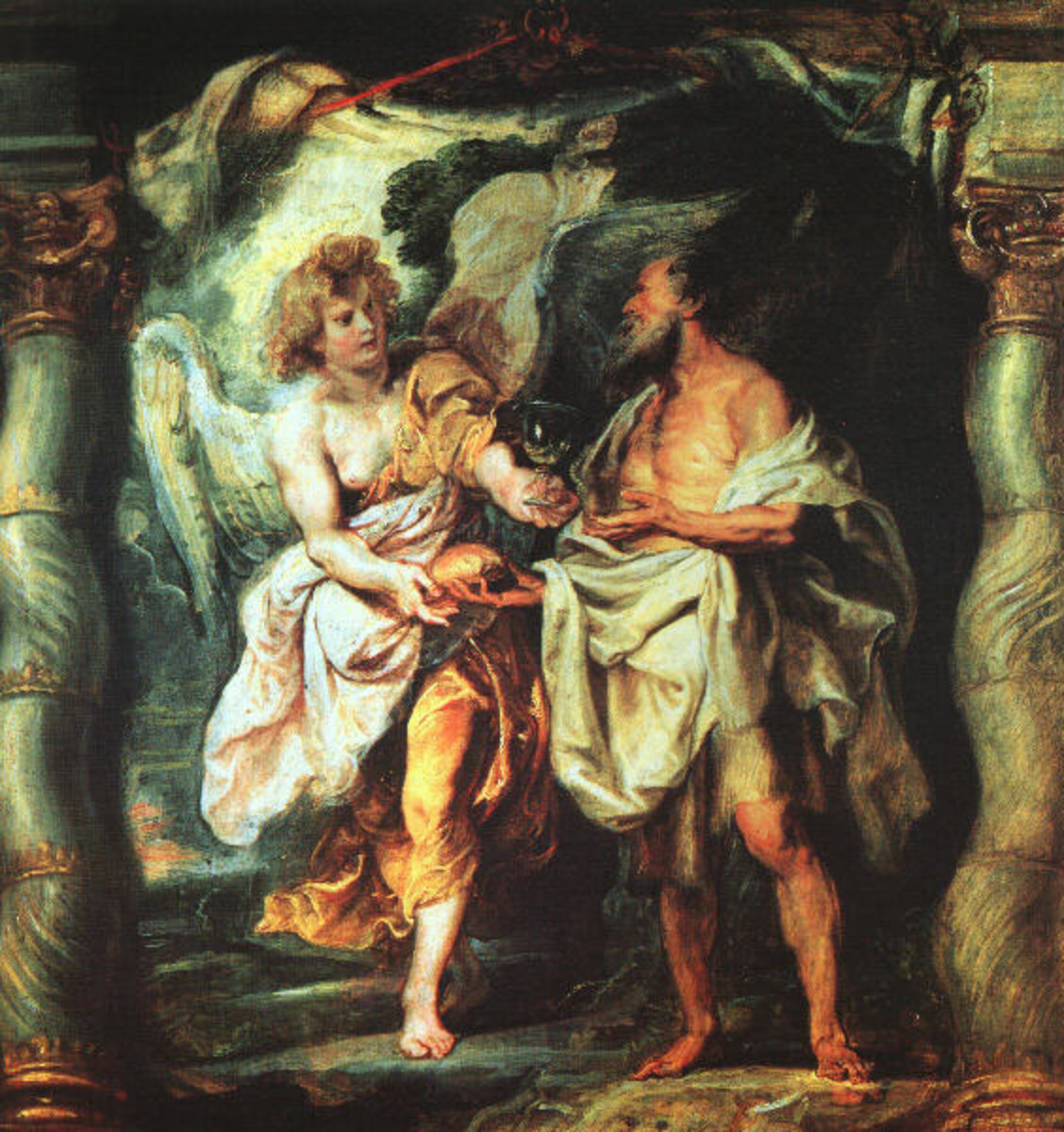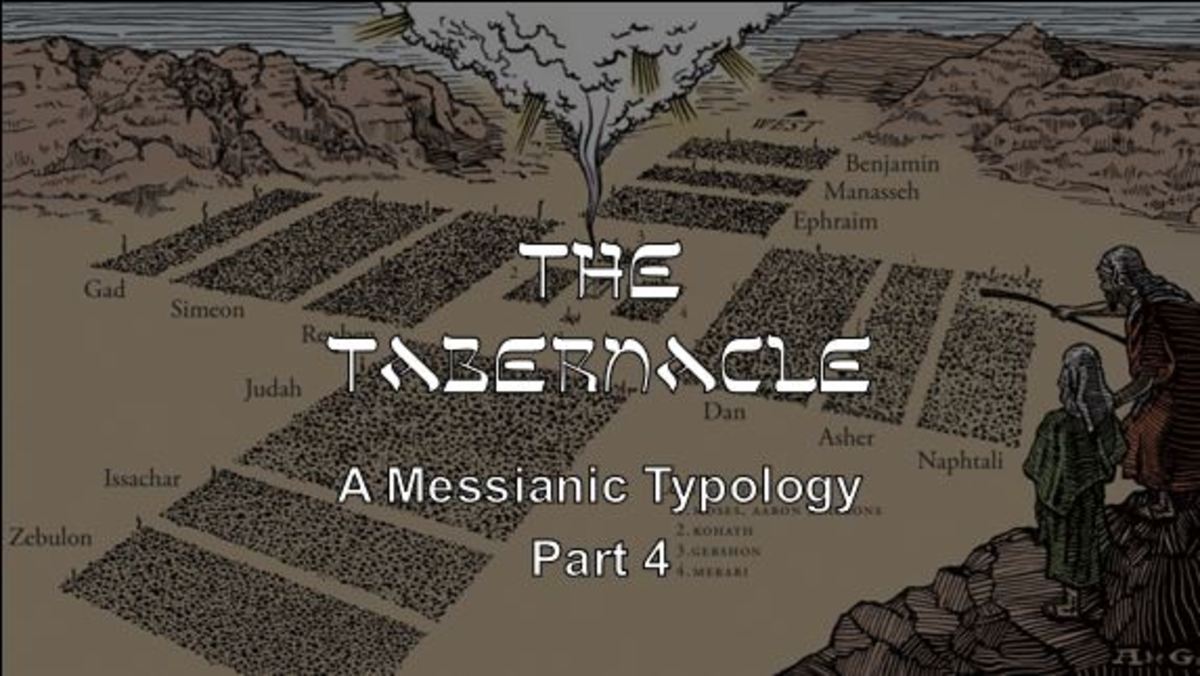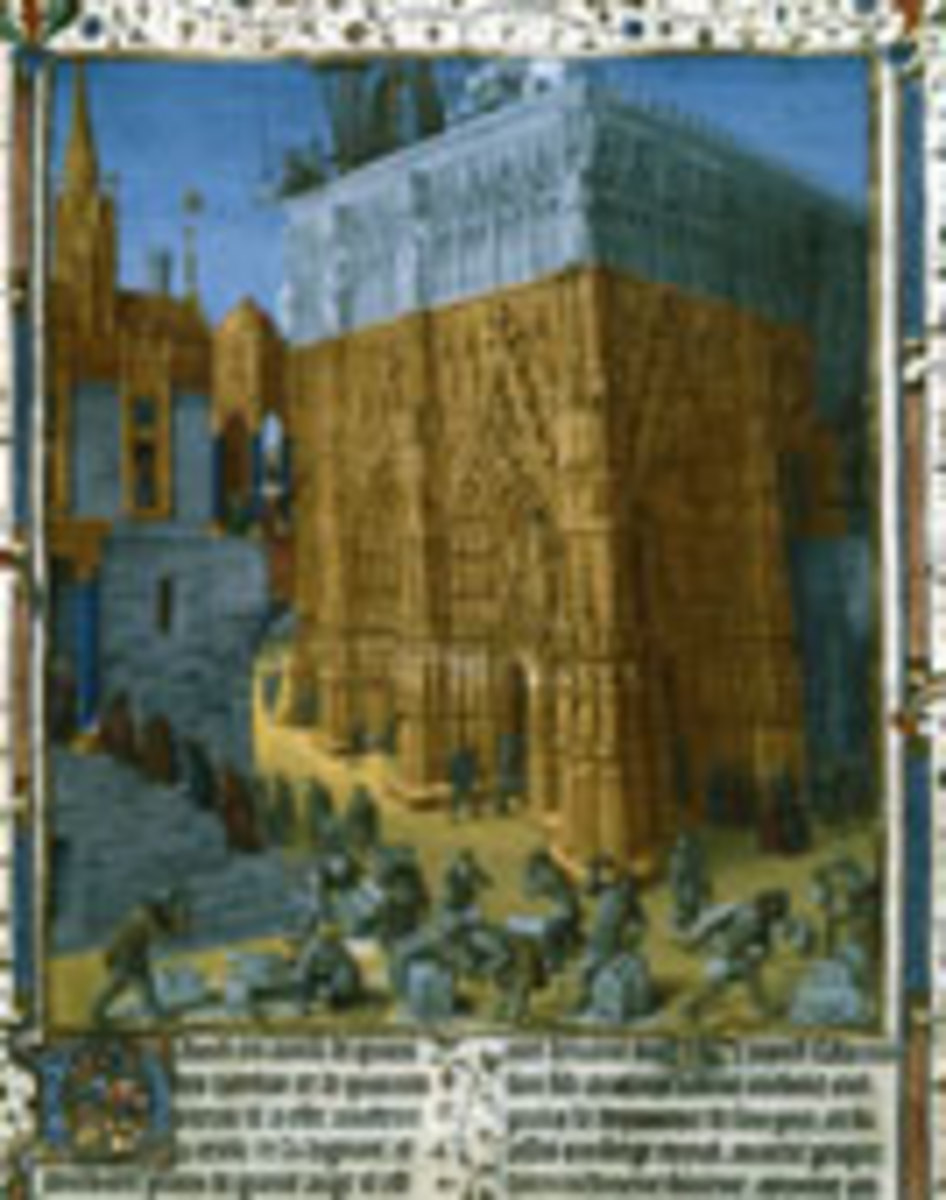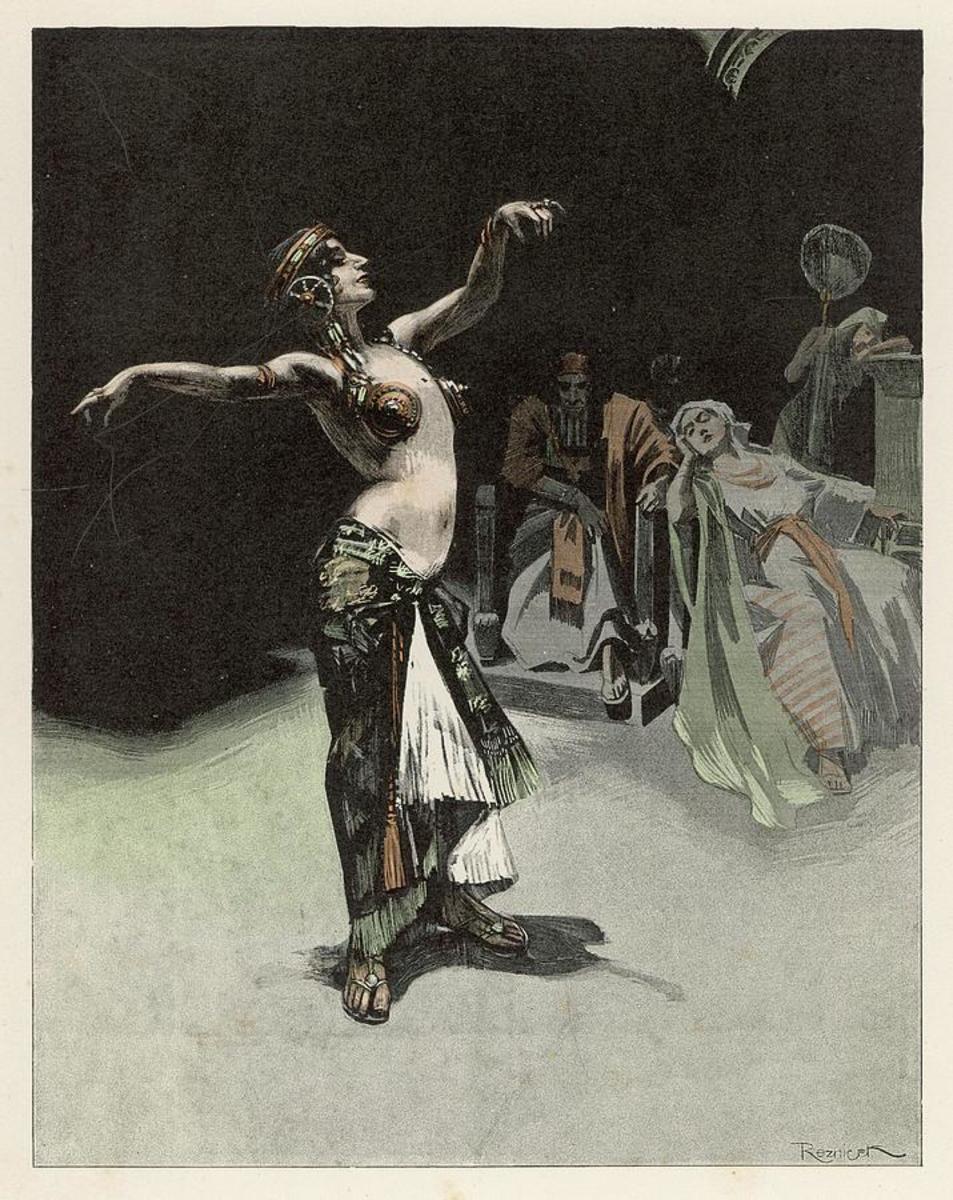Yahweh - the inconvenient truth: Part 4
Moses
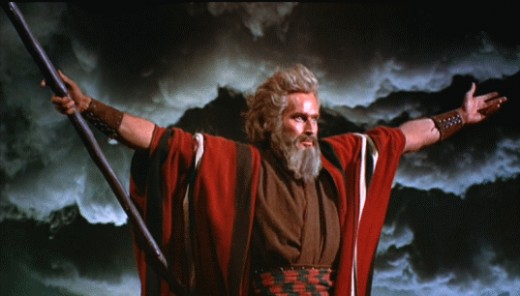
Yahweh a god of warrior and the god of Israel
It is in Exodus that Yahweh comes into his own, finally being divorced of El.
Exodus 6:
…2God spoke further to Moses and said to him, "I am the LORD; 3and I appeared to Abraham, Isaac, and Jacob, as God Almighty, but by My name, LORD, I did not make Myself known to them. 4"
It is a common misconception that Yahweh only revealed Himself to Moses. The Kenite hypothesis attempts to explain the origin of the Yahwist religion. It proposes that the Israelites learned of Yahweh through Moses who himself was acquainted with through his Kenite father-in-law Kenite father who was a Midianite priest. When Moses fled Egypt to the wilderness, he joined the Kenites, a Midianite tribe of nomads living in the desert about Sinai. Moses married into this tribe. Their tribal deity was Yahweh, the Kenite god. Moses therefore converted to their religion and became a devotee of Yahweh’s. It was required of the “sojourner”, i.e. Moses, to adopt the religion of his father-in-law according to the clans’s matriarchal exogamous constitution. He was to worship the god of the place where he dwelt.
Exodus 3:1
Moses and the Burning Bush
3 Now Moses was tending the flock of Jethro his father-in-law, the priest of Midian, and he led the flock to the far side of the wilderness and came to Horeb, the mountain of God.
Therefore prior to Moses, Horeb (also Mt Sinai) was considered to be the sanctuary of God. A priest was already stationed there.
Exodus 2:16
“Now a priest of Midian had seven daughters, and they came to draw water and fill the troughs to water their father's flock.”
Yahweh in the Old Testament dwelt on Mt Sinai so this is evidence that the Kenites had Yahweh as their god prior to the Israelites.
Lending credence to the case that Yahweh was not first known to Moses is that there is no case where a reformer would preach the existence of a brand new god. He would perhaps provide a new interpretation on an existing God like Jesus did with the Father. Or he would exalt an obscure god or proclaim a god of another nation but never invent a god.
Also, Yahweh is not a Hebrew name and is not understood to a Hebrew. The lack of knowledge how to explain the interpretation of Yahweh suggests that the name is borrowed from some other language and fitted with Hebrew etymology.
So once Moses led his fellow tribesmen out of bondage, he took them to the “mountain of god” to convert them to Yahwism. There Yahweh and the tribes from Egypt took their vows and become allies. He adopted them as he people and became the King of Israel. It was more than just adopting the Israelites because they entered his territory. He made a covenant with them voluntarily and graciously. He was to be their leader and fight for them. I am sure this was to be a symbiotic relationship because the Israelites would benefit Yahweh greatly later.
When the Israelites conquered Canaan, hey found that the lands of Canaan were fertile. The farmers attributed this fertility to their god, Baal, known as the fertility god. The reader may be confused at this point about why Yahweh is called Baal when there was another Baal in Canaan already being worshipped by the Canaanites. It so happened that as time went by, the Canaanites and Israelites living side by side, Yahweh became to resemble his antagonist, Baal.
Novelist James Michener said:
In fact, when the average citizen...prostrated himself before Yahweh he could scarcely have explained which god he was worshiping, for El had passed into Baal and he into El-Shaddaiy and all into Yahweh...**
There was the chief Baal but there different localities that had their individual baals. Just as the clans of Israel had needed Yahweh, so did the Canaanites need their baals for the rains and for the lands to be fertile. Yahweh and the Baals, at first, had different functions so it was not impossible to have loyalty to both. Yahweh was a good leader in battle so there were Israelites who were loyalty to him. However, the baals provided prosperity and would worship a baal when they wanted rain.
However, in time, here was no choosing which god to worship but rather Yahweh and the baals blended into one another. The worship of Yahweh was incorporated into the customs of the “high places” where the Canaanites worshipped. Cultures living so close together would inevitably contaminate each other.
The prophet, Hosea, was a strict Yahwist and to combat the worship of baals, he insisted on crediting Yahweh with the functions of agriculture (Hosea 2:8-9) which was the baals’ domain yet lambasted against the worship of them and rightfully so as the Hebrews adopted the Canaanites rituals sexual acts in the shrine of the god to encourage fertility. So sodomy and prostitution bled into Yahweh worship.
THEY ASSYRIAN INVASION
After the death of King Jeroboam 2, who ruled over Israel, the northern kingdom was in a state of anarchy. At the same time, Assyria wished to conquer Israel.
Because of this invasion, several thousand Israelites of ancient Samaria were captured by the Assyrians and resettled. Tiglath-Pileser III and Shalmaneser V, the Neo-Assyrians monarchs conquered the Northern Kingdom of Israel. It was under the rule of Sargon III and his successor, Sennacherib, that caused the twenty year demise of Israel’s northern ten-tribe kingdom. Jerusalem was seized by not conquered.
It was during this tribulation that three prophets came to the forefront: Hosea, Isaiah and Amos. All three of them urged the Israelites to return to Yahweh and abandon the worship of the other gods.
Hosea was from the northern kingdom ministering from 755-710 BC in the form of prophecies. Hosea pleaded to Israel that Yahweh still loved them despite their infidelity. He called for repentance.
In 722 BC, nearly twenty years after the initial deportations, the ruling city of the Northern Kingdom of Israel, Samaria, was finally taken by Sargon II after a three-year siege started by Shalmaneser V. Just before then Hosea prophesized that because Israel had abandoned Yahweh, their judgement was imminent.
Amos was a prophet who railed against the rich for oppressing the poor and demanded social injustice. He exposed the social destructiveness of the royal policy (Amos 2:16)
On the cusp of the Assyrian invasion, the Israelites hoped that Yahweh would appear to defend them. They knew him to be a great warrior who had defended them in the past. However, Amos puts them straight saying, “Beware, you awaiting the day of Yhwh? Why would you have the day of Yhwh? It is dark and not light. (5:18)
This time, the Assyrians will not be the target of Yahweh’s wrath but the Israelites themselves. He believed that the punishment was imminent and inevitable. Unlike what Hosea said, there was no chance to repent.
Like Amos, Isaiah also criticized the official religion over the demands of social justice. He was God’s spokesperson to Judah and Jerusalem during a time where the people were indulging in great sin. He urged them to repent and warned of the punishment awaiting them from Yahweh if they did not repent.
He prophesized that the Lord would use Assyria, Babylon and Medes to serve his purposes and judge them afterwards alongside other nations. There would just be desolation because of their sins.
King Josiah and the Book of the Law
However, this was not the end of Yahweh worship. The cult of Yahweh was resurrected with King Josiah, a descendant of King David, in 622 BC. He ascended to the throne after the assassination of his father. While the predecessors were tolerant of pagans, Josiah was a strict Yahwist. He, like the prophets, believed that the social problems stemmed from the Israelites turning their back on their god, Yahweh. It was Hilkiah the high priest, who discovered the Book of the Law. He found it at the temple in Jerusalem while it was undergoing repairs ordered by Josiah. Scholars believe that Josiah was referring in 2 Kings 22-23 to the middle chapters of the Book of Deuteronomy which formed part of the Torah. It is noteworthy to add that 2 Kings does not indicate that it was a lost book that was rediscovered. The authors of Kings do not indicate that they were aware of the Torah of Moses.
Josiah implemented a system which was accepted by the Judahite monorachy. He made law that God (Yahweh) was the only god to be worshipped and that Jerusalem was the only legitimate place where Yahweh could be worshipped and sacrifices made.
Radical and even violent reforms were made. Josiah purges the pagan practices in the royal shrine erected by King Solomon. He also ordered his high priest Hikiah to destroy vessels made for Baal and for Asherah. They were burned outside Jerusalem in the fields and the ashes deposited in Bethel. He got rid of the idolatrous pagan priests who were ordained by the king to make offerings to Baal and moon/sun gods in the high places in Judah and around Jerusalem. They were slaughtered on the altars and human bones were burned on them as prophecized in 1 Kings 13.1-2.
Josiah was convinced that there were prophecies about him:
1 Kings 13.1-2.
By the word of the Lord a man of God came from Judah to Bethel, as [the Israelite king] Jeroboam was standing by the altar to make a [pagan] offering. He cried out against the altar by the word of the Lord: 'O altar, altar! This is what the Lord says: "A son named Josiah will be born to the house of David. On you he will sacrifice the [pagan] priests of the high places who now make offerings here, and human bones will be burned on you."'
This was a case of a self-fulfilling prophecy. Josiah sought to conquer Israel. He believed that he would one David-like king who would purge and restore Israel. When Assyria was doomed years later, Josiah set out on his quest, believing he had a divine right to do so. He gathered a large army and armed himself with the sacred texts to prove his historical rights. The sacred texts he had were revised versions of Joshua, Judges, Samuel 1 and 2, Kings 1 and 2 to make gospel of his divine right. Most historians credit Josiah for being responsible for establishing or compiling the important Hebrew Scriptures during the “Deuternomic reform” which happened during his rule.
However, it was not only Josiah who sought to conquer Israel. The Egyptian king, Necho 11, also wanted to. They clashed at Megiddo in northern Israel and Josiah was slain. To the Jews, this presented a serious problem. Due to the prophecies, they believed Josiah was going to be the anointed king of Israel from the house of David to restore Israel. It was clear that this was not a prophecy about him. To address this conundrum, the prophecies were reinterpreted. It referred to a future ruler that would be the anointed one who would restore Israel and be of Jewish heritage. The concept of Messianism was born years after the death of Josiah. It is due to this reinterpreted prophecy, which could not have been divine as it was manipulated, that the Jews believed Jesus was the Messiah. He did not fulfil the requirements of the Messiah anticipated by the Jews. He did not restore Israel, liberate the Jews and was not a King.
The Reformation
Inspired by the “Book of the Law”, there came into being a great reformation. It inspired the composition of the national epic of Judah in the 7th-8th century BC. Significant changes were to be made on books such as Judges, Kings, Samuel, Joshua and Exodus. A small nation such as Judah needed a grand story. The Bible was reconstructed. Authors and editors referred to many diverse and conflicting traditions which they biasedly used to embellishment the narrative. The Old Testament was never meant to be a history book. It was theological and ideological. It was meant to be written in such a way so that the past could flow into their present and meet. The Hebrew Bible emphasized the national and social impact on the people who worshipped God.
The Jewish epic in the Bible contained 2 core parts. The first are the five books of Genesis, Levitius, Numbers and Deuteronomy. This is a nutshell tells us about Israel’s beginning with the ancestors, continue with the bondage in Egypt and the 40 years in the wilderness with the aim of reaching the Promised Land. The second section contains Joshua, Judges, Samuel and Kings. This focuses on the conquering of Canaan, the rule of the judges, the union and division of the monarchy and the destruction of the northern and southern kingdom by the Assyrians. Then it moves to the Babylonian Exile. The second section is usually referred to the Deuteronimistic history because it contains the language and ethos of Deuteromony. That is about how critical it was to obey God’s law which resulted in blessings and in the case of disobedience punishment.
There was a need to depict a story in such a way that would serve the needs of a seventh century Judah for a united kingdom. This is illustrated by the Judean patriarch, Abraham, being brought together with Jacob, the Israelite patriarch. There was a pastoral landscape in these stories that appealed to the Judean population. Many aspects of Josiah were incorporated into the stories like Exodus. The story of Moses confronting Pharoah in Exodus was symbolic of Josiah confronting Pharoah Necho II. Both Josiah and Moses fought in the name of God and commanded that their people remain faithful to Yahweh. King David is also like Josiah. They were sole legitimate heirs of the dynasty. They both desired a united kingdom, expansion of territory and many military conquests.
It is proposed that there were in the beginning two distinct Hebrew societies living in the highlands of Canaan. Thus both were Canaanites even though there was much diatribe against the Canaanites by the Israelites. The division was such that even today the united monarchy is referred to as “the kingdoms of Israel and Judah”. Judah was weaker, more rural and less influential than Israel. It only came to the forefront after the fall of Israel to Assyria in 722 BC. Now being heirs to the northern traditions, Judas decided what would become part of their epic and how it was to be interpreted.
Judah would distort its picture of itself by maligning Israel in its national epic. Archaeological records show that there were local shrines for the worship of Yahweh as well as other deities. This was the case also in Jerusalem. A desire for a unified land only came into being in the late 8th century BC due to demographic growth and social transformation as well as struggling to survive under the shadow of the Assyrian Empire. A syncretic worship was a threat to unification and to cut out the worship of the other gods, some in Jerusalem vilified the local Judean shrines as Canaanite evil. They wanted Yahweh to be worshiped alone and a center for this worship to be in Jerusalem. This new religion was named their traditional one, brushing aside the real history of the tradition and calling it heresy. This was the groundwork for Josiah's Deuteronomic reformation in the next century.
As Judah maligned Israel in its national epic, so it presented a skewed picture of itself. Archaeological data show that the traditional religion of this isolated and sparsely populated nation consisted of local shrines (''high places'') for the worship of YHWH alongside other deities. These syncretic practices prevailed also in Jerusalem. Demographic growth, social transformation and the desire for a unified land came only in the late eighth century B.C., and they were probably related to the struggle for national survival under the shadow of the Assyrian empire. Sensing the threat of syncretic worship to unification, certain unidentified circles in Jerusalem condemned the local Judean shrines as a Canaanite evil and pushed for something new: a ''YHWH-alone'' religion centered in Jerusalem. Ironically, they labeled this new religion the traditional one and so turned the traditional religion into heresy. Their work prepared the way for Josiah's Deuteronomic reformation in the next century.
But Josiah's violent death at the hands of Pharaoh Necho II put the lie to Deuteronomistic theology. Obedience to YHWH-alone by the ideal king did not prevent Egypt's return to enslave the people of Israel. Even Egypt's defeat a few years later by Babylon brought not relief but destruction to Judah. By 587 B.C. the inevitable was complete. The Babylonian devastation of Judah, from outlying cities to proud Jerusalem, and the subsequent exile of its aristocracy are both biblical and archaeological realities.
We know what happened to King Josiah. The Deuteronomistic theology supposed that if one was obedient to God, then only blessings would ensue. Yet this was put to the test. Despite obeying Yahweh implicitly, king Josiah was slain and Egypt enslaved the Israelites. Even though Egyptian was defeated a few years later, Judah was still destroyed by the Babylonians and Jerusalem itself. This led to the Babylonian Exile in 587 BC.
To account for this, the exiles had to revise the national saga again by creating a second edition of the Deuteronomistic history. The destruction was due to the evil of an earlier king, Manasseh. So even though King Josiah was obedient to God, the damage had already been done. King Josiah could not have prevented it. He only delayed it. The theology now was that the unconditional promise of Yahweh to David and his kingdom was contingent on the conditional covenant made between Yahweh and the people of Sinai. This was to provide hope for the defeated and displaced people. If the people obeyed the commandments of Yahweh, they would have a future regardless if they had an evil ruler.
With this new theology established, Joshua and Judges were edited. The Pentateach was given a Deuteronomist interpretation.
It was a moral victory for the Hebrews to establish one faith in God. The alternative would have been to believe in the power of the gods of Babylon. The hope was that social justice that represented Yahweh would conquer.
The Babylonian Exile
When the Israelites were exiled to Babylon, they found it awash in polytheism. The dominant god was Marduk. To preserve their religion, Ezekiel espoused that their God was the one true God in existence and the other gods worshipped in Babylonian were not really gods at all. It was at this time, that monotheism started. When once they believed in many gods, now were empty to them. The Judaism we have today actually comes from the Babylonian Exile Jews. They returned to Jerusalem to erect a new temple for their God which formed part of a religion far removed from 50 years ago.
This marked the birth of monotheism and paved the way for the Son of God to enter the world to die for our sins. Jesus could never have come when the Israelites were polytheistic for which god would He be the son of? God had to wait for the belief in one God. Although I don’t believe Yahweh is the Father and that God used the opportunity to send Jesus so the Jews could know the Father Who they didn’t quite know. Jesus needed to dispel what was not right about what they knew about Yahweh. That was that God was not exclusive to one nation. According to the Old Testament, Yahweh exclusively fought for the Jews. The Israelites believed that they were God’s chosen people and thus everyone is inferior. Yet Jesus said, “Love your enemies”. At that time, the Jews would not associate themselves with Gentiles. Even the disciples wanted to keep Christianity exclusive to Jews until Paul preached that Jesus was for Gentiles also.
Sadly, the belief that Yahweh was a warrior who came exclusively for the Jews led up to Jesus’ crucifixion. He was clearly not the Messiah predicted as they were expecting a military leader who would free Israel from the Roman Empire. Yet this, too, was used by God. If this did not happen, then Jesus could not have died for our sins.

